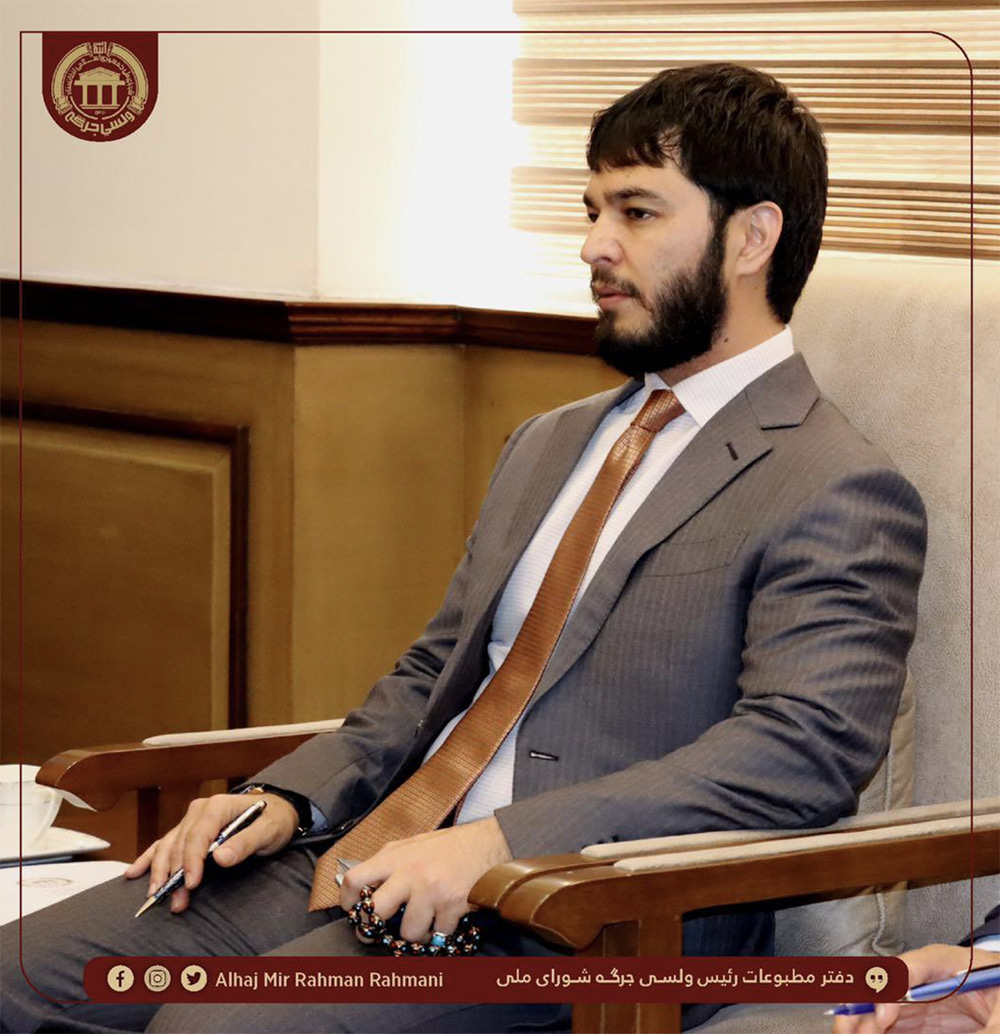In the years before former Afghan parliamentarian Ajmal Rahmani was sanctioned for allegedly misappropriating U.S. government aid intended to help rebuild his war-torn country, he built a sprawling business and real estate empire in Germany and Dubai.
Cyprus played a key role in his success.
Between 2018 and 2022, Ajmal Rahmani amassed real estate in Germany worth 197 million euros ($212 million), according to reporting by OCCRP’s media partner ZDF frontal. He bought the properties using Cypriot holding companies, as well as German firms registered with his Cyprus passport.
 Ajmal Rahmani. (Photo: Screenshot of tweet shared by @MRahmanRhamani)Leaked data shows that five properties in Dubai –– worth about $3.2 million in total –– were also registered to Ajmal Rahmani’s Cypriot passport.
Ajmal Rahmani. (Photo: Screenshot of tweet shared by @MRahmanRhamani)Leaked data shows that five properties in Dubai –– worth about $3.2 million in total –– were also registered to Ajmal Rahmani’s Cypriot passport.
In December 2023, the U.S. Treasury Department sanctioned him and his father, Mir Rahman Rahmani, for alleged corruption that included manipulating Afghanistan’s fuel market in order to misappropriate U.S. reconstruction funds.
On January 31, the Rahmanis filed an ongoing lawsuit against the U.S. government in response in which they “categorically deny any involvement in any fuel procurement corruption scheme.”
The Rahmanis’ lawsuit also inadvertently solved a mystery: It revealed that the father and son both continued to hold Cypriot citizenship.
OCCRP reported in December that a Cyprus government-appointed committee had advised authorities to consider revoking their passports, because they had allegedly violated regulations governing the application process.
“The possibility of depriving the investor of citizenship should be considered,” said a 2021 internal report about Ajmal Rahmani from the committee, which was obtained by reporters.
The recommendations from the committee headed by former Supreme Court President Myron Nicolatos were non-binding, and it is not known if Cyprus reviewed the Rahmanis’ citizenship. Cyprus authorities did not respond to a request for comment.
In an emailed response to questions, Ajmal Rahmani said his citizenship “was acquired and disclosed to the relevant authorities in full compliance with the laws of Cyprus.”
Nicolatos was appointed by the Attorney General’s Office in 2021 to look into irregularities in Cyprus’ citizenship-by-investment program, which had been shut down after an Al Jazeera investigation revealed deep corruption.
Officials were captured on a hidden camera discussing bribes in exchange for providing a fictional Chinese criminal with a passport from Cyprus, which is part of the European Union. That caused an uproar in other member states, because Cyprus citizenship could allow undesirable individuals to travel freely, and do business in EU countries.
Passports and Property
Austrian property records show that Cypriot citizenship helped Tahmina Tajali, the wife of Ajmal Rahmani, purchase a villa in the ski resort town of Kitzbühel in 2020. The property, which cost 10.5 million euros, is registered to her Cyprus passport.
 The villa purchased by Tahmina Tajali in the ski resort town of Kitzbühe, in Austria. (Photo: Maria Retter/Paper trail media)
The villa purchased by Tahmina Tajali in the ski resort town of Kitzbühe, in Austria. (Photo: Maria Retter/Paper trail media)
Austrian regulations require people from countries outside the EU to obtain approval from local authorities before buying a property. Permission is granted only if there is a cultural, social or economic interest in concluding the transaction, and if the purchase will not impair “national political interests.”
A Cyprus passport also unlocked access to Austrian real estate for the romantic partner of a sanctioned Russian oil boss, we recently revealed. Read more here.
“In addition to increased mobility, being a citizen of an EU member state brings certain privileges,” said Eka Rostomashvili, of the advocacy group Transparency International. “Among them is less scrutiny when opening a bank account or a company.”
In his continuing lawsuit against the U.S. government, Ajmal Rahmani highlighted the use of his Cypriot passport in building up his business, noting that he “obtained a citizenship by investment from Cyprus, and began investing in Europe.”
When asked about reports that prosecutors in the German city of Stuttgart were investigating real estate transactions related to his businesses, Ajmal Rahmani said that he was “actively cooperating with the Stuttgart Public Prosecutor's Office through our legal representatives to support their preliminary examinations.”
After shutting down its golden passport program, Cyprus canceled citizenship for scores of people, including Jho Low, a financier at the center of the massive 1MDB scandal, which saw billions of dollars siphoned out of a Malaysian state fund.
As it turns out, Jho Low was a neighbor of Ajmal Rahmani in the resort town of Ayia Napa, on Cyprus’ southeast coast. A purchase agreement cited by the Nicolatos Committee indicates that Ajmal Rahmani paid the minimum investment of 2.5 million euros for a beachfront villa in 2014, the same year he applied for his passport.
 Financier Jho Low. (Photo: WENN Rights Ltd/Alamy Stock Photo)In another crossover with Jho Low, the Rahmanis used the same two companies to help process their applications, Henley & Partners and FidesCorp Limited. Leaked invoices show that Ajmal Rahmani paid 55,000 euros in fees to Henley Estates, the local passport broker to global company Henley & Partners.
Financier Jho Low. (Photo: WENN Rights Ltd/Alamy Stock Photo)In another crossover with Jho Low, the Rahmanis used the same two companies to help process their applications, Henley & Partners and FidesCorp Limited. Leaked invoices show that Ajmal Rahmani paid 55,000 euros in fees to Henley Estates, the local passport broker to global company Henley & Partners.
In an emailed response to questions, Henley & Partners spokesperson Sarah Nicklin said its finance department had “done a thorough check and cannot locate any payment received from Rahman Rahmani and/or his son Ajmal Rahmani.”
“However, it could be that these individuals were referred to independent local service providers, and that Henley Estates was involved in the associated real estate purchase,” Nicklin added.
“Henley Estates never processed citizenship applications but was a real estate business which was being acquired by Henley & Partners, and therefore our firm was neither responsible for the application processing nor for the real estate transactions of these individuals,” Nicklin said.
The leaked invoice stated that Henley Estates billed Ajmal Rahmani on behalf of Henley & Partners for “Citizenship Application Fees.”
According to findings by the Nikolatos Committee, Ajmal Rahmani appears to have paid at least 90,000 euros to FidesCorp, which is co-owned by the former son-in-law of Demetris Syllouris, a Cypriot politician now facing corruption charges in connection with the passport scheme. There is no suggestion that Syllouris or his former son-in-law did anything illegal in regard to the Rahmani’s passport applications.
An internal report from Nicolatos Committee notes that FidesCorp processed successful citizenship applications for the wife and daughters of Mir Rahmani, even though their paperwork included suspected “forged documents.”
“It is clear that Fides Corp did not comply with their obligations in relation to the applicants,” the report said.
FidesCorp did not respond to a request for comment.
“No credible authorities or legal bodies have brought such accusations against me or my dependents,” Mir Rahmani said in an email. “All business transactions conducted in Cyprus have been lawful, fully transparent, reported to all relevant authorities, and strictly following international standards and regulations.”
Canceled Contracts
While the Rahmanis’ January 31 lawsuit shows that they maintained their citizenship despite advice from the Nicolatos Committee to review their status, they say they are now worried that the Treasury sanctions could cost them their Cypriot passports.
In their lawsuit, the Rahmanis argue that sanctions are “exposing them to serious risk of loss of citizenships, potential deportation to Afghanistan where they and their families, if returned, would encounter serious threat and risk of persecution and physical harm at the hands of the Taliban.”
The lawsuit expressed concern that Ajmal Rahmani could be forced to leave Dubai if his Cyprus passport was revoked, noting that “his residency is tied to his Cypriot citizenship.”
In addition to the $3.2 million worth of Dubai real estate registered to his Cypriot passport, Ajmal Rahmani developed two more properties that were purchased for a total of $6.9 million. He did this via two UAE-registered companies he owned, Ocean Estate Company Limited and The Fern Limited. The properties are now the sites of the Ocean Residencia and Fern Heights residential developments, which together generate over $2 million in annual rental income.
Ajmal Rahmani has also complained that the sanctions are affecting his considerable business interests in Germany, where his companies own $212 million worth of real estate. (In an email, Ajmal Rahmani said he was “unable to confirm this figure.”)
The U.S. sanctions have been “disrupting business relationships enjoyed by Plaintiff A. Rahmani and companies under his ownership, and also negatively impacting the employees of those companies jeopardizing their livelihoods,” the lawsuit says.
Among other alleged impacts, the German unit of the computer giant IBM canceled the lease for its head office in the country, which was in a building owned by a subsidiary of Ajmal Rahmani’s Cyprus holding company, RG Holdings Limited.
The city of Ehningen announced its “suspension of an urban development plan” with RG Holdings’ German subsidiary to redevelop the property once the IBM lease was up at the end of 2024. Ajmal Rahman had planned to turn it into a “mixed-use residential, commercial, educational and technology project,” the lawsuit says.
In an email, Ajmal Rahmani said authorities were still discussing the future of the development, but he was confident that the final decision would be in his favor.
“We maintain full confidence in our position, anticipating complete exoneration,” he said.
Hannes Munzinger and Sophia Baumann (paper trail media) contributed reporting.



